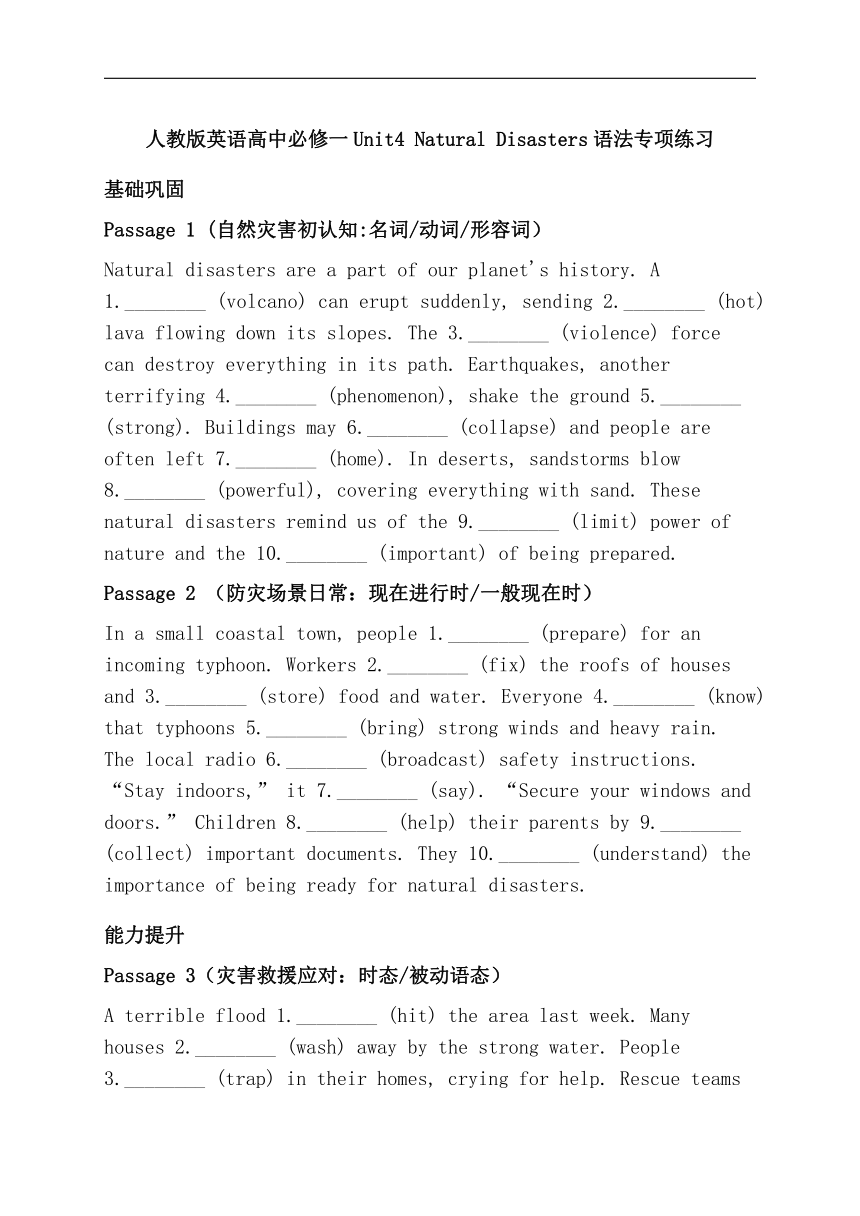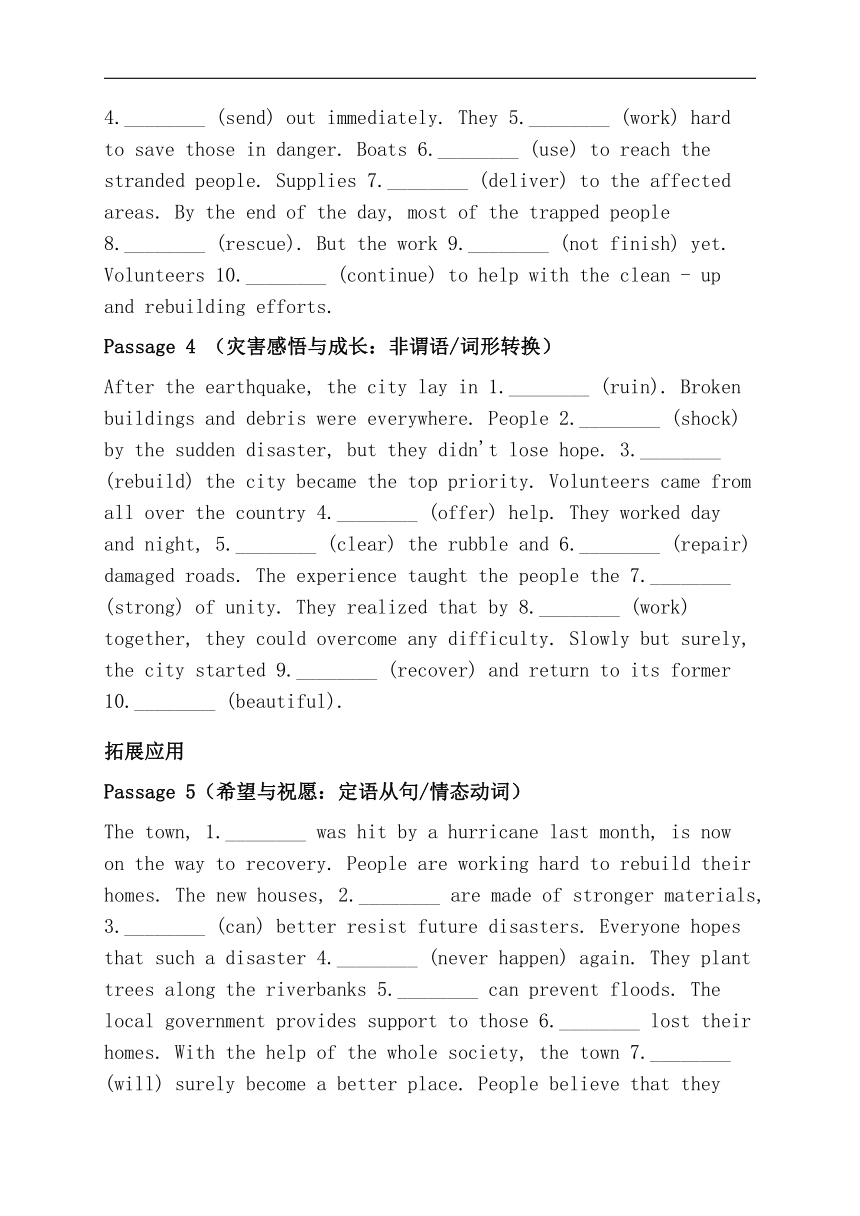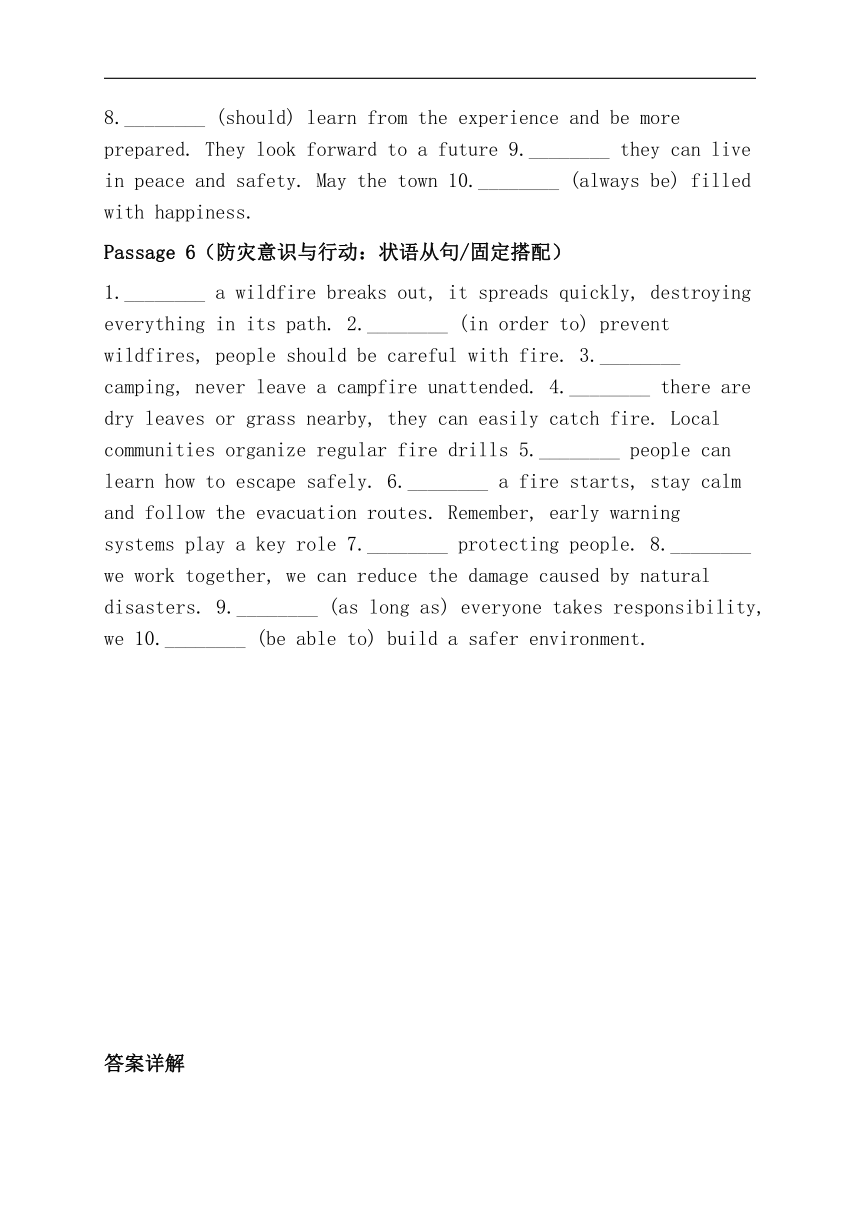Unit4 Natural Disasters语法专项练习(含答案)-2025-2026学年高中英语人教版(2019)必修第一册
文档属性
| 名称 | Unit4 Natural Disasters语法专项练习(含答案)-2025-2026学年高中英语人教版(2019)必修第一册 |  | |
| 格式 | docx | ||
| 文件大小 | 22.1KB | ||
| 资源类型 | 教案 | ||
| 版本资源 | 人教版(2019) | ||
| 科目 | 英语 | ||
| 更新时间 | 2025-08-02 17:14:36 | ||
图片预览



文档简介
人教版英语高中必修一Unit4 Natural Disasters语法专项练习
基础巩固
Passage 1 (自然灾害初认知:名词/动词/形容词)
Natural disasters are a part of our planet's history. A 1.________ (volcano) can erupt suddenly, sending 2.________ (hot) lava flowing down its slopes. The 3.________ (violence) force can destroy everything in its path. Earthquakes, another terrifying 4.________ (phenomenon), shake the ground 5.________ (strong). Buildings may 6.________ (collapse) and people are often left 7.________ (home). In deserts, sandstorms blow 8.________ (powerful), covering everything with sand. These natural disasters remind us of the 9.________ (limit) power of nature and the 10.________ (important) of being prepared.
Passage 2 (防灾场景日常:现在进行时/一般现在时)
In a small coastal town, people 1.________ (prepare) for an incoming typhoon. Workers 2.________ (fix) the roofs of houses and 3.________ (store) food and water. Everyone 4.________ (know) that typhoons 5.________ (bring) strong winds and heavy rain. The local radio 6.________ (broadcast) safety instructions. “Stay indoors,” it 7.________ (say). “Secure your windows and doors.” Children 8.________ (help) their parents by 9.________ (collect) important documents. They 10.________ (understand) the importance of being ready for natural disasters.
能力提升
Passage 3(灾害救援应对:时态/被动语态)
A terrible flood 1.________ (hit) the area last week. Many houses 2.________ (wash) away by the strong water. People 3.________ (trap) in their homes, crying for help. Rescue teams 4.________ (send) out immediately. They 5.________ (work) hard to save those in danger. Boats 6.________ (use) to reach the stranded people. Supplies 7.________ (deliver) to the affected areas. By the end of the day, most of the trapped people 8.________ (rescue). But the work 9.________ (not finish) yet. Volunteers 10.________ (continue) to help with the clean - up and rebuilding efforts.
Passage 4 (灾害感悟与成长:非谓语/词形转换)
After the earthquake, the city lay in 1.________ (ruin). Broken buildings and debris were everywhere. People 2.________ (shock) by the sudden disaster, but they didn't lose hope. 3.________ (rebuild) the city became the top priority. Volunteers came from all over the country 4.________ (offer) help. They worked day and night, 5.________ (clear) the rubble and 6.________ (repair) damaged roads. The experience taught the people the 7.________ (strong) of unity. They realized that by 8.________ (work) together, they could overcome any difficulty. Slowly but surely, the city started 9.________ (recover) and return to its former 10.________ (beautiful).
拓展应用
Passage 5(希望与祝愿:定语从句/情态动词)
The town, 1.________ was hit by a hurricane last month, is now on the way to recovery. People are working hard to rebuild their homes. The new houses, 2.________ are made of stronger materials, 3.________ (can) better resist future disasters. Everyone hopes that such a disaster 4.________ (never happen) again. They plant trees along the riverbanks 5.________ can prevent floods. The local government provides support to those 6.________ lost their homes. With the help of the whole society, the town 7.________ (will) surely become a better place. People believe that they 8.________ (should) learn from the experience and be more prepared. They look forward to a future 9.________ they can live in peace and safety. May the town 10.________ (always be) filled with happiness.
Passage 6(防灾意识与行动:状语从句/固定搭配)
1.________ a wildfire breaks out, it spreads quickly, destroying everything in its path. 2.________ (in order to) prevent wildfires, people should be careful with fire. 3.________ camping, never leave a campfire unattended. 4.________ there are dry leaves or grass nearby, they can easily catch fire. Local communities organize regular fire drills 5.________ people can learn how to escape safely. 6.________ a fire starts, stay calm and follow the evacuation routes. Remember, early warning systems play a key role 7.________ protecting people. 8.________ we work together, we can reduce the damage caused by natural disasters. 9.________ (as long as) everyone takes responsibility, we 10.________ (be able to) build a safer environment.
答案详解
Passage 1
volcano 前面有不定冠词a,所以用名词单数形式volcano。
hot 修饰名词lava,用形容词hot。
violent 修饰名词force,用形容词violent。
phenomenon another修饰单数名词,phenomenon的单数形式就是phenomenon。
strongly 修饰动词shake,用副词strongly。
collapse 情态动词may后接动词原形,所以用collapse。
homeless leave sb. +形容词,表示“使某人处于某种状态”,这里表示人们无家可归,用homeless。
powerfully 修饰动词blow,用副词powerfully。
limitless 修饰名词power,结合语境,这里表示大自然无穷的力量,用limitless。
importance the +名词+ of,所以用important的名词形式importance。
Passage 2
are preparing 根据语境,人们正在为即将到来的台风做准备,用现在进行时are preparing。
are fixing 与前面的are preparing并列,描述正在进行的动作,用现在进行时are fixing。
storing 与are fixing并列,省略了are,用storing。
knows everyone作主语,谓语动词用第三人称单数形式knows。
bring typhoons是复数,一般现在时中,谓语动词用原形bring。
is broadcasting 当地广播正在播报安全指示,用现在进行时is broadcasting。
says it作主语,谓语动词用第三人称单数形式says。
are helping children作主语,这里表示孩子们正在帮助父母,用现在进行时are helping。
collecting by是介词,后接动词 - ing形式collecting。
understand they作主语,一般现在时中,谓语动词用原形understand。
Passage 3
hit last week是一般过去时的标志,hit的过去式还是hit。
were washed houses与wash away之间是被动关系,且是一般过去时,所以用were washed。
were trapped people与trap之间是被动关系,用一般过去时的被动语态were trapped。
were sent rescue teams与send out之间是被动关系,用一般过去时的被动语态were sent。
worked 描述过去发生的动作,用一般过去时worked。
were used boats与use之间是被动关系,用一般过去时的被动语态were used。
were delivered supplies与deliver之间是被动关系,用一般过去时的被动语态were delivered。
were rescued people与rescue之间是被动关系,用一般过去时的被动语态were rescued。
hasn't finished yet常与现在完成时连用,主语the work是不可数名词,所以用hasn't finished。
continued 描述过去发生的动作,用一般过去时continued。
Passage 4
ruins in ruins是固定短语,表示“成为废墟”。
were shocked people与shock之间是被动关系,且是一般过去时,所以用were shocked。
Rebuilding 这里是动名词作主语,所以用Rebuilding。
to offer 此处是动词不定式作目的状语,所以用to offer。
clearing 与working并列,作伴随状语,用clearing。
repairing 与clearing并列,作伴随状语,用repairing。
strength the +名词+ of,所以用strong的名词形式strength。
working by是介词,后接动词 - ing形式working。
to recover start to do sth. 表示“开始做某事”,所以用to recover。
beauty its former后接名词,所以用beautiful的名词形式beauty。
Passage 5
which 先行词是the town,在定语从句中作主语,非限制性定语从句用which引导。
which 先行词是the new houses,在定语从句中作主语,用which引导。
can 表示“能够”,用情态动词can。
will never happen 根据语境,希望这样的灾难再也不会发生,用一般将来时will never happen。
which/that 先行词是trees,在定语从句中作主语,用which或that引导。
who 先行词是those,指人,在定语从句中作主语,用who引导。
will 根据语境,这里表示将来,用will。
should 表示“应该”,用should。
where 先行词是future,在定语从句中作地点状语,用where引导。
always be may后接动词原形,所以用always be。
Passage 6
When/Once 引导时间状语从句,表示“当……时候”或“一旦”,用When或Once。
In order to 表示“为了”,用In order to。
When/While 引导时间状语从句,表示“当……时候”,用When或While。
If 引导条件状语从句,表示“如果”,用If。
so that 引导目的状语从句,表示“以便”,用so that。
When/Once 引导时间状语从句,表示“当……时候”或“一旦”,用When或Once。
in play a role in是固定搭配,表示“在……中起作用”。
If 引导条件状语从句,表示“如果”,用If。
As long as 表示“只要”,用As long as。
will be able to 根据语境,这里表示将来,用will be able to。
基础巩固
Passage 1 (自然灾害初认知:名词/动词/形容词)
Natural disasters are a part of our planet's history. A 1.________ (volcano) can erupt suddenly, sending 2.________ (hot) lava flowing down its slopes. The 3.________ (violence) force can destroy everything in its path. Earthquakes, another terrifying 4.________ (phenomenon), shake the ground 5.________ (strong). Buildings may 6.________ (collapse) and people are often left 7.________ (home). In deserts, sandstorms blow 8.________ (powerful), covering everything with sand. These natural disasters remind us of the 9.________ (limit) power of nature and the 10.________ (important) of being prepared.
Passage 2 (防灾场景日常:现在进行时/一般现在时)
In a small coastal town, people 1.________ (prepare) for an incoming typhoon. Workers 2.________ (fix) the roofs of houses and 3.________ (store) food and water. Everyone 4.________ (know) that typhoons 5.________ (bring) strong winds and heavy rain. The local radio 6.________ (broadcast) safety instructions. “Stay indoors,” it 7.________ (say). “Secure your windows and doors.” Children 8.________ (help) their parents by 9.________ (collect) important documents. They 10.________ (understand) the importance of being ready for natural disasters.
能力提升
Passage 3(灾害救援应对:时态/被动语态)
A terrible flood 1.________ (hit) the area last week. Many houses 2.________ (wash) away by the strong water. People 3.________ (trap) in their homes, crying for help. Rescue teams 4.________ (send) out immediately. They 5.________ (work) hard to save those in danger. Boats 6.________ (use) to reach the stranded people. Supplies 7.________ (deliver) to the affected areas. By the end of the day, most of the trapped people 8.________ (rescue). But the work 9.________ (not finish) yet. Volunteers 10.________ (continue) to help with the clean - up and rebuilding efforts.
Passage 4 (灾害感悟与成长:非谓语/词形转换)
After the earthquake, the city lay in 1.________ (ruin). Broken buildings and debris were everywhere. People 2.________ (shock) by the sudden disaster, but they didn't lose hope. 3.________ (rebuild) the city became the top priority. Volunteers came from all over the country 4.________ (offer) help. They worked day and night, 5.________ (clear) the rubble and 6.________ (repair) damaged roads. The experience taught the people the 7.________ (strong) of unity. They realized that by 8.________ (work) together, they could overcome any difficulty. Slowly but surely, the city started 9.________ (recover) and return to its former 10.________ (beautiful).
拓展应用
Passage 5(希望与祝愿:定语从句/情态动词)
The town, 1.________ was hit by a hurricane last month, is now on the way to recovery. People are working hard to rebuild their homes. The new houses, 2.________ are made of stronger materials, 3.________ (can) better resist future disasters. Everyone hopes that such a disaster 4.________ (never happen) again. They plant trees along the riverbanks 5.________ can prevent floods. The local government provides support to those 6.________ lost their homes. With the help of the whole society, the town 7.________ (will) surely become a better place. People believe that they 8.________ (should) learn from the experience and be more prepared. They look forward to a future 9.________ they can live in peace and safety. May the town 10.________ (always be) filled with happiness.
Passage 6(防灾意识与行动:状语从句/固定搭配)
1.________ a wildfire breaks out, it spreads quickly, destroying everything in its path. 2.________ (in order to) prevent wildfires, people should be careful with fire. 3.________ camping, never leave a campfire unattended. 4.________ there are dry leaves or grass nearby, they can easily catch fire. Local communities organize regular fire drills 5.________ people can learn how to escape safely. 6.________ a fire starts, stay calm and follow the evacuation routes. Remember, early warning systems play a key role 7.________ protecting people. 8.________ we work together, we can reduce the damage caused by natural disasters. 9.________ (as long as) everyone takes responsibility, we 10.________ (be able to) build a safer environment.
答案详解
Passage 1
volcano 前面有不定冠词a,所以用名词单数形式volcano。
hot 修饰名词lava,用形容词hot。
violent 修饰名词force,用形容词violent。
phenomenon another修饰单数名词,phenomenon的单数形式就是phenomenon。
strongly 修饰动词shake,用副词strongly。
collapse 情态动词may后接动词原形,所以用collapse。
homeless leave sb. +形容词,表示“使某人处于某种状态”,这里表示人们无家可归,用homeless。
powerfully 修饰动词blow,用副词powerfully。
limitless 修饰名词power,结合语境,这里表示大自然无穷的力量,用limitless。
importance the +名词+ of,所以用important的名词形式importance。
Passage 2
are preparing 根据语境,人们正在为即将到来的台风做准备,用现在进行时are preparing。
are fixing 与前面的are preparing并列,描述正在进行的动作,用现在进行时are fixing。
storing 与are fixing并列,省略了are,用storing。
knows everyone作主语,谓语动词用第三人称单数形式knows。
bring typhoons是复数,一般现在时中,谓语动词用原形bring。
is broadcasting 当地广播正在播报安全指示,用现在进行时is broadcasting。
says it作主语,谓语动词用第三人称单数形式says。
are helping children作主语,这里表示孩子们正在帮助父母,用现在进行时are helping。
collecting by是介词,后接动词 - ing形式collecting。
understand they作主语,一般现在时中,谓语动词用原形understand。
Passage 3
hit last week是一般过去时的标志,hit的过去式还是hit。
were washed houses与wash away之间是被动关系,且是一般过去时,所以用were washed。
were trapped people与trap之间是被动关系,用一般过去时的被动语态were trapped。
were sent rescue teams与send out之间是被动关系,用一般过去时的被动语态were sent。
worked 描述过去发生的动作,用一般过去时worked。
were used boats与use之间是被动关系,用一般过去时的被动语态were used。
were delivered supplies与deliver之间是被动关系,用一般过去时的被动语态were delivered。
were rescued people与rescue之间是被动关系,用一般过去时的被动语态were rescued。
hasn't finished yet常与现在完成时连用,主语the work是不可数名词,所以用hasn't finished。
continued 描述过去发生的动作,用一般过去时continued。
Passage 4
ruins in ruins是固定短语,表示“成为废墟”。
were shocked people与shock之间是被动关系,且是一般过去时,所以用were shocked。
Rebuilding 这里是动名词作主语,所以用Rebuilding。
to offer 此处是动词不定式作目的状语,所以用to offer。
clearing 与working并列,作伴随状语,用clearing。
repairing 与clearing并列,作伴随状语,用repairing。
strength the +名词+ of,所以用strong的名词形式strength。
working by是介词,后接动词 - ing形式working。
to recover start to do sth. 表示“开始做某事”,所以用to recover。
beauty its former后接名词,所以用beautiful的名词形式beauty。
Passage 5
which 先行词是the town,在定语从句中作主语,非限制性定语从句用which引导。
which 先行词是the new houses,在定语从句中作主语,用which引导。
can 表示“能够”,用情态动词can。
will never happen 根据语境,希望这样的灾难再也不会发生,用一般将来时will never happen。
which/that 先行词是trees,在定语从句中作主语,用which或that引导。
who 先行词是those,指人,在定语从句中作主语,用who引导。
will 根据语境,这里表示将来,用will。
should 表示“应该”,用should。
where 先行词是future,在定语从句中作地点状语,用where引导。
always be may后接动词原形,所以用always be。
Passage 6
When/Once 引导时间状语从句,表示“当……时候”或“一旦”,用When或Once。
In order to 表示“为了”,用In order to。
When/While 引导时间状语从句,表示“当……时候”,用When或While。
If 引导条件状语从句,表示“如果”,用If。
so that 引导目的状语从句,表示“以便”,用so that。
When/Once 引导时间状语从句,表示“当……时候”或“一旦”,用When或Once。
in play a role in是固定搭配,表示“在……中起作用”。
If 引导条件状语从句,表示“如果”,用If。
As long as 表示“只要”,用As long as。
will be able to 根据语境,这里表示将来,用will be able to。
